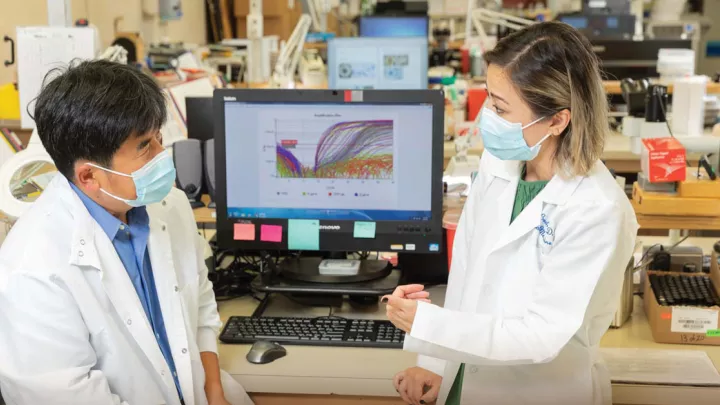
Jennifer Dien Bard, PhD, D(ABMM), F(CCM)
Jennifer Dien Bard. Ph.D., D(ABMM), F(CCM) is the Director of Clinical Microbiology and Virology Laboratory at Children’s Hospital Los Angles.
After receiving her Bachelor of Science degree in Medical Laboratory Science from the University of Alberta, Canada, Jennifer Dien Bard earned her Doctor of Philosophy degree in Medical Sciences studying the aberrant activation of Signal Transducer and Activator of Transcription-3 in the pathogenesis of Cancer in the laboratory of Dr. Raymond Lai, MD, PhD, at the University of Alberta, Canada.
She completed a Medical Microbiology and Public Health Fellowship at UCLA and is a Diplomate of the American Board of Medical Microbiology, Fellow of the Canadian College of Microbiologists and a licensed Clinical Microbiologist.
Development of novel, non-culture based methods such as molecular techniques to improve the rapidity and detection of microbiological agents associated with infections; detection and exploration of emerging mechanisms of antimicrobial resistance and development of improved susceptibility testing for bacterial and fungal agents.
Education
University of Alberta, Edmonton
University of California, Los Angeles: Medical and Public Health Microbiology
Accomplishments
American Board of Medical Microbiology (ABMM), Fellow of the Canadian College of Microbiologists (FCCM)
- American Society for Microbiology
- American Society for Clinical Pathology
- Canadian College of Microbiologists
- Canadian Association for Clinical Microbiology and Infectious Diseases
Publications
Van TT, Mongkolrattanothai K, Arevalo M, Lustestica M, and Dien Bard J: Impact of a Rapid Herpes Simplex Virus PCR Assay on Duration of Acyclovir Therapy. J Clin Microbiol, 55(5):1557-1565, 2017.
Van TT, Cox LM, Cox ME and Dien Bard J: Prevalence of Fusobacterium necrophorum in Children Presenting with Pharyngitis. J Clin Microbiol, 55(4):1147-1153, 2017.Dien Bard J, Mongkolrattanothai K, Kachroo P, Beres S, Olsen RJ: Case Series Description and Genomic Characterization of Invasive Group A Streptococcal Infections in Pediatric Patients. Ped Infect Dis J, 36(6):618-620, 2017.
Mongkolrattanothai K and Dien Bard J: Utility of Direct Specimen Detection by Sanger Sequencing in Hospitalized Pediatric Patients. Diagn Microbial Infect Dis, 87(2):100-102, 2017.
Mongkolrattanothai, Kanokporn, Naccache S, Bender J, Samayoa E, Pham Elizabeth, Yu Guixia, Dien Bard J, Miller Steve, Aldrovandi G, Chiu CY. Neurobrucellosis: Unexpected Answer from Metagenomic Next-Generation Sequencing. J Ped Infect Dis, manuscript accepted, 2017.
Dien Bard J, Naccache SN, Bender JF. Use of a Molecular Panel to Aid in Diagnosis of Culture-Negative Meningitis. J Clin Microbiol, 54(12):3069-70, 2016.
Anand V*, Holmen J, Neely M, Pannaraj P, Dien Bard J. The Brief Case: Neonatal Meningitis Caused by Listeria monocytogenes Diagnosed by Multiplex Molecular Panel. J Clin Microbiol, 54(12):2846-49, 2016.
Leber AL, Everhart K, Balada-Llasat JM, Cullison J, Daly J, Holt S, Lephart P, Salimnia H, Schreckenberger PC, DesJarlais S, Reed SL, Chapin KC, LeBlanc L, Johnson JK, Soliven NL, Carroll KC, Miller JA, Dien Bard J, Mestas J, Bankowski M, Enomoto T, Hemmert AC, Bourzac KM. Multicenter Evaluation of BioFire FilmArray Meningitis/Encephalitis Panel for Detection of Bacteria, Viruses, and Yeast in Cerebrospinal Fluid Specimens. J Clin Microbiol, 54(9):2251-61, 2016.
Dien Bard J and McElvania-Tekippe E. Mini-review: The Diagnosis of Blood Stream Infections in Children. J Clin Microbiol, 54(6):2251-61, 2016
Felsenstein S*, Bender JM, Gentry M, Takemoto C, Dien Bard J: Impact of a Rapid Blood Culture Assay for Gram-Positive Identification and Detection of Resistance Markers in a Pediatric Hospital. Arch Pathol Lab Med, 140(3):267-75, 2016.
Humphries RM and Dien Bard J. Point-Counterpoint: Reflex cultures reduce laboratory workload and improve antimicrobial stewardship in patients suspected of having urinary tract infections? J Clin Microbiol, 54(2):254-8, 2016.
Wu MT, Burnham CA, Westblade LF, Dien Bard J, Lawhon SD, Burd E, Hindler J, Humphries RM. Evaluation of oxacillin and cefoxitin disk and MIC breakpoints for the prediction of mecA mediated resistance in human and veterinary isolates of Staphylococcus pseudointermedius. J Clin Microbiol, 54(3):535-42, 2016.
Pannaraj PS, Dien Bard J, Beekman SE. Polgreen PM, Weissman SJ. Carbapenem Resistant Enterobacteriaceae: A Pediatric Case Series and First Report of New Delhi Metallo-Beta-Lactamase Carbapenemase Producing Escherichia coli in Children in the United States. Ped Infect Dis J. 34(1):11-6, 2015.
Felsenstein S, Faddoul D, Sposto R, Batoon K, Polanco CM, Dien Bard J: Epidemiology and Molecular Diagnosis of Group A Streptococcus Pharyngitis in Pediatric Patients. J Clin Microbiol. 52(11):3884-9, 2014.
Mestas J, Felsenstein S, Dien Bard J: Direct Identification of Bacteria from Positive Blood Culture Bottles Using Matrix-Assisted Laser Desorption Ionization-Time of Flight Mass Spectrometry: Comparison of MALDI Sepsityper kit and Laboratory Developed Lysis-Method from BacT/ALERT Blood Culture Bottles. Diagn Microbial Infect Dis. 2014, [Epub ahead of print].
Dien Bard J, Gold H, Limbago B, Hindler J. Rationale for eliminating Staphylococcus breakpoints for beta-lactam agents other than penicillin, oxacillin or cefoxitin. Clin Infect Dis 58(9):1287-96, 2014.
Mestas J, Polanco CM, Felsenstein S, Dien Bard J. Performance of the Verigene Gram-Positive Blood Culture Assay for the Direct Detection of Gram-positive Organisms and Resistance Markers in a Pediatric Hospital. J Clin Microbiol, 52(1): 283-7, 2014.
Research
Dr. Dien Bard’s research interests are in the development of rapid, novel methods, including molecular tests, for the detection and characterization of microorganisms in clinical specimens and the detection of resistance determinants and susceptibility profiles of infectious pathogens. She is also interested in studying the impact of rapid laboratory diagnostics on antimicrobial optimization, patient outcome and healthcare costs.
Research Studies
We are studying how responses to the rotavirus vaccine are influenced by infant nutrition and other exposures in different areas of the world. The information we get from this study may help us to understand how to best protect infants from rotavirus and other infections.
We would like to study how the body responds to the flu infections or flu vaccine in mothers and their children.
Media
CBS News - Researchers work to identify COVID-19 mutations as more contagious variants spread
New York Times - Rapid Testing for Children Barrels Ahead, Despite a Lack of Data
New York Times- A Rapid Virus Test Falters in People Without Symptoms, Study Finds
New York Times - Companies Ditch Plans for Rapid Coronavirus Spit Tests at Home
NY Times - Flu Season Could Make Coronavirus Testing Delays Even Worse


